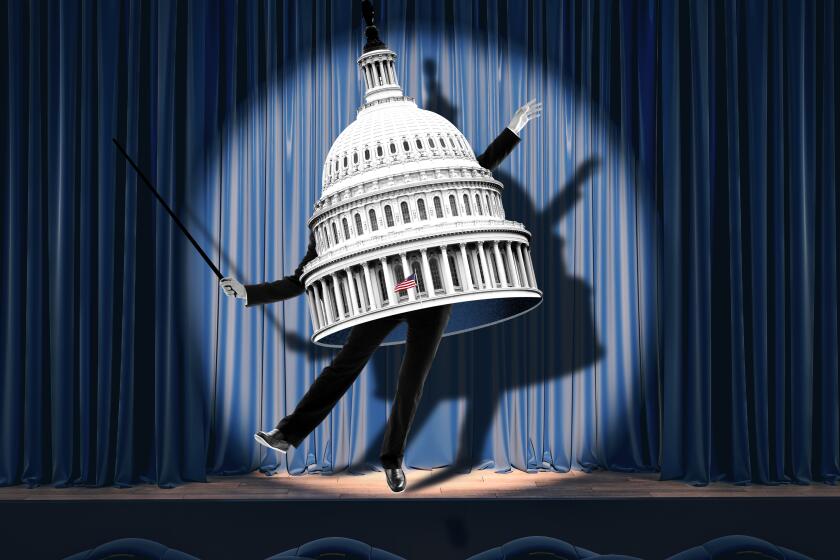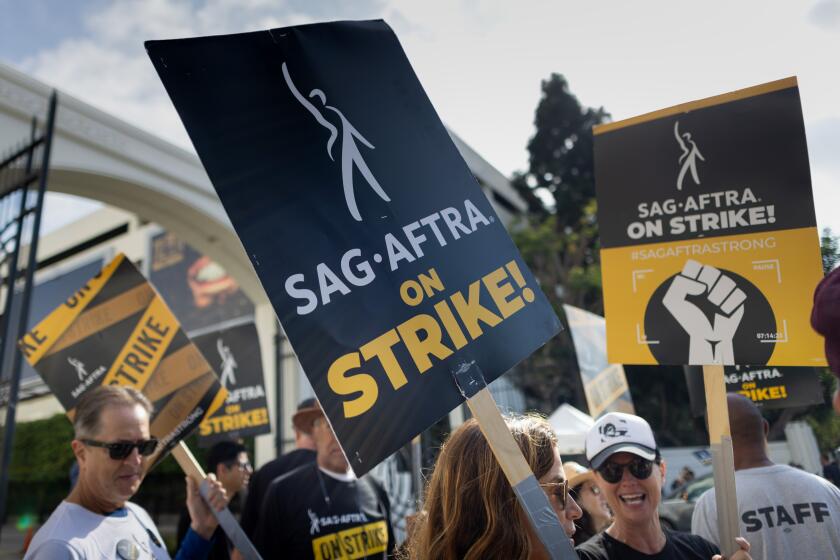Actors’ Equity, Broadway League settle after historic effort to organize ‘Waitress’ tour

Actors’ Equity Assn., the national union representing more than 51,000 professional actors and stage managers working in live theater, and the Broadway League, the national trade association for the Broadway industry, on Monday announced a settlement agreement following last year’s organizing effort of the nonunion touring company of “Waitress.”
As part of the settlement, the 22 actors and stage managers employed by the tour’s production company, NETworks, received an undisclosed sum. Equity has withdrawn a grievance filed last year against producers and Broadway League members Barry and Fran Weissler and their company, the National Artists Management Co., which licensed the hit musical, for “double-breasting” — profiting from union and nonunion workers at the same time.
For the record:
12:21 p.m. Nov. 6, 2023A previous version of this article misstated the terms of the settlement agreement. The tour’s actors and stage managers received an undisclosed sum in compensation, but were not placed on an Equity contract.
“Actors’ Equity Association and The Broadway League are pleased that the parties were able to reach a settlement of the grievance filed by Actors’ Equity Association in May 2022 in connection with the most recent tour of the musical ‘Waitress,’” the organizations said in a joint statement. ”The settlement is an amicable resolution acknowledging the interests of all parties, including the producers, actors and stage managers, given the unique circumstances regarding this production.”
The settlement is the culmination of the “Waitress” tour’s election petition, which marked the first time Equity has attempted to organize a nonunion tour since “The Music Man” tour in 2001. The union hopes that the actors and stage managers of other current and future nonunion tours seek Equity’s representation in negotiations with their employers.
Lin-Manuel Miranda, Phylicia Rashad and others will unveil a new bill Thursday as the industry struggles: ‘If you’re not at the table, you’re on the menu.’
“Every worker who wants the protection of a union contract deserves to get one,” Equity’s mobilization director, Stefanie Frey, told The Times. “The choice of whether a tour is union or not is actually in the hands of the actors and stage managers, but it’s not an overnight switch. We can support the folks on tour through the process of getting organized, empowering them with the tools and the guidance needed to claim their power, raise their wages and improve their working conditions.”
Nonunion tours are generally considered a more cost-effective way to take Broadway shows on the road than union ones, with actors and stage managers often making shorter stops, staying in double-occupancy housing and receiving payment below union-negotiated minimums. (Current nonunion tours include “The Book of Mormon,” “Chicago,” “Come From Away,” “Hairspray” and “Mean Girls,” among others.)
“The nonunion tour usually exists when there is a concern about how much profit producers can get with the Equity contract margin, sometimes when they feel they’ve exhausted the big cities and they’re on a second or third circuit of the touring venues,” said Frey. Those employed by the tour, she added, are usually workers “looking for a springboard into the industry — a lot of young folks fresh from college, or people who are thankful for the job and maybe are more willing to work under those harder conditions.”
In a unique situation, the nonunion “Waitress” tour occurred at the same time as a separate, union “Waitress” tour. Though both were performing the same musical on stages, participants in the nonunion tour did so without Equity-negotiated protections like health insurance or pension contributions, and receiving approximately one-third of the pay of their unionized counterparts. Numerous cast members held day jobs while performing on tour to supplement their wages, according to Frey, and some actors of the nonunion production later performed in the union tour and in the Broadway production — the latter when a majority of its cast was unable to perform due to a COVID outbreak.
In April 2022, Equity filed with the National Labor Relations Board to bargain on behalf of actors and stage managers employed by the tour. Equity organizers gathered union authorization cards from a majority of the actors and stage managers on the “Waitress” tour, designating Equity to negotiate on their behalf with NETworks.
Thousands of actors signed an open letter reaffirming their commitment to the strike. Julia Louis-Dreyfus and Pedro Pascal are among the signatories.
“The work we do is the same work our friends in the Equity tour do, so we are asking our employers why we can’t be treated with the same respect,” members of the non-Equity tour said in a joint statement at the time. “We have tried to work with management to improve our conditions on multiple fronts and have come to the conclusion that we need a union to work on our behalf.”
However, Equity withdrew its election petition the following month after NETworks informed the NLRB that the show, which had planned to continue through 2023 at the time the organizing effort began, was now scheduled only until June 2022, which would not allow enough time to hold a union vote.
In turn, Equity opened the double-breasting grievance against the Weisslers and their company, which was found to have a financial interest in the non-Equity tour. As the Weisslers are members of the Broadway League, such an interest was in violation of the League’s contractual agreement with Equity.
Based on the 2007 film, “Waitress” centers on Jenna, a small-town diner server whose unexpected pregnancy spurs her to chase her dream of opening a pie shop. With music and lyrics by Sara Bareilles and a book by Jessie Nelson, “Waitress” opened on Broadway in 2016 and received four Tony nominations. A filmed version of the stage show, with Bareilles in the lead role, is set to play in movie theaters beginning Dec. 7.
More to Read
The biggest entertainment stories
Get our big stories about Hollywood, film, television, music, arts, culture and more right in your inbox as soon as they publish.
You may occasionally receive promotional content from the Los Angeles Times.













